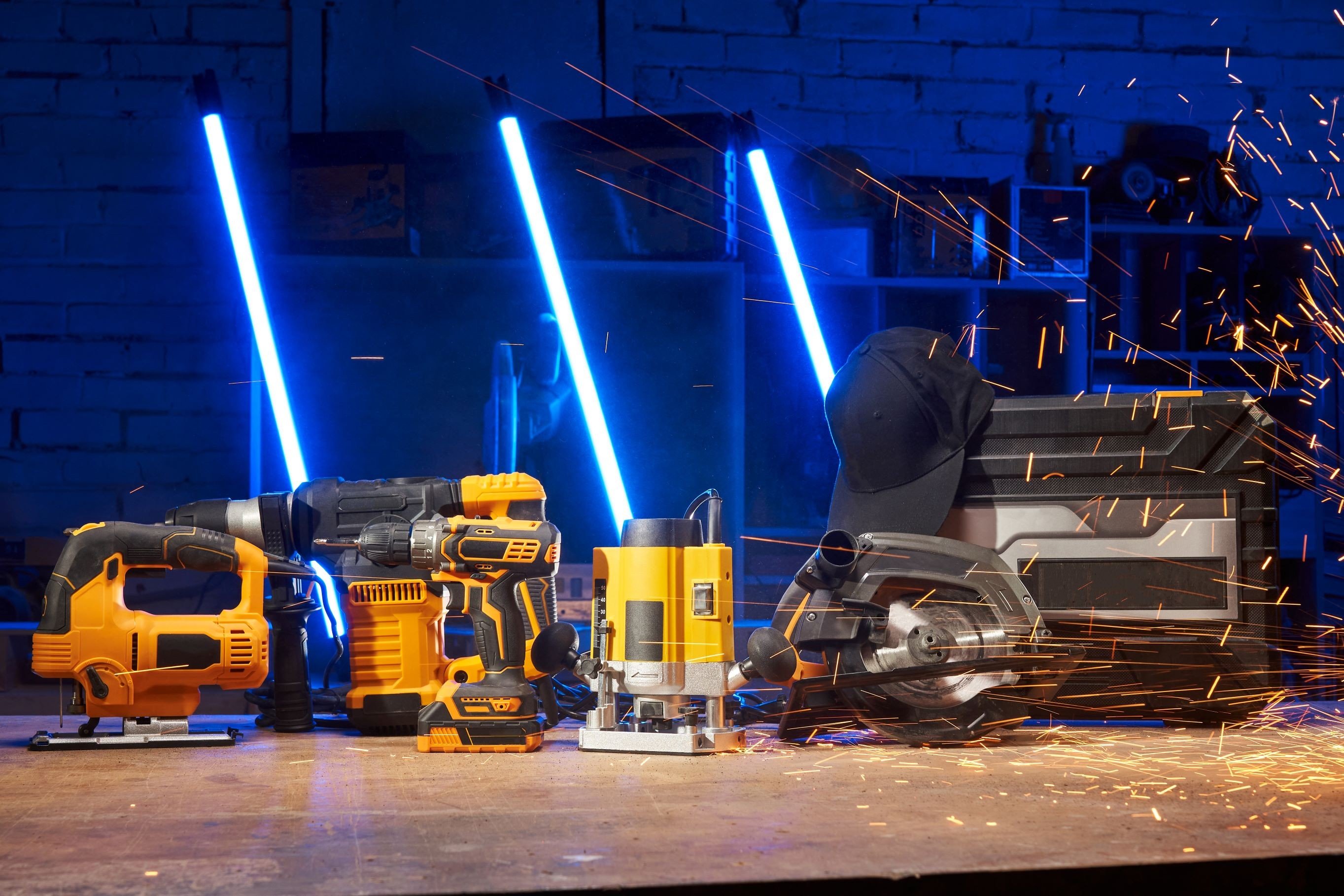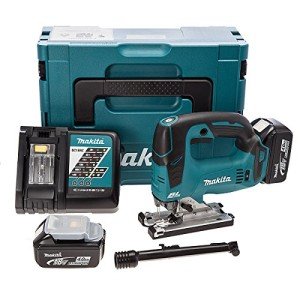10 Sites To Help You To Become An Expert In Shop Power Tools
페이지 정보

본문
 The Workhorse of the Shop Power Tools
The Workhorse of the Shop Power ToolsHand-held power tools are powered by internal combustion, electricity, or compressed air. They may be used for cutting, drilling or sanding the material.
One of the first power tools that every woodworker must own is a table saw, which makes quick work of almost any cutting job. Also, consider a miter saw stand and a drill/driver set.
Table Saw
A table saw is the workhorse of the shop power Buy Tools Online and perhaps the most versatile woodworking tool. It can rip, cross-cut, miter cut, and even dado and rabbet stock. It also cuts angled surfaces for chests, frames or planters.
The circular blade of the saw is large and Uk power tools (please click the next page) rotates at high speed. It has tables of a decent size (infeed and outfeed) that help support the stock as it passes through the blade. Blade guards protect the blade of the saw, preventing wood from getting caught and then thrown back to the operator. The saw is also protected by a splitter, or the riving blade. It is a vertical projection that is directly behind the blade and can be shaped like pin or fin.
Contractor-style table saws have a larger motor that hinges from the rear of the saw and drives the blade using one or two rubber v-belts. These saws are generally used by carpenters and tradesman however they can be found in home shops as well. They are more advanced than portable saws, for instance a sliding miter table.
Table saws that are smaller have a smaller, lighter-duty motor which is usually driven by belt. These saws are more geared towards the hobbyist and home use. Many of them come with a sliding mitertable that allows users to make intricate cuts, like those required for picture and mirror frames, as well as boxes drawers, cases, and frames.
Using a table saw properly is essential to avoid injury. Always be to the left of the blade when making cuts that rip and keep your hands clear of the saw's edge. When cutting, it's important to utilize a guide block or push stick. This is particularly true in commercial environments where HSE guidelines require you to keep at least one hand span from the blade.
Many woodworking projects call for tapered legs, and the simplest and fastest method of cutting them is with a table saw and a simple adjustable tapering jig which you can create at home. A tapering jig is adjusted to any angle between 0 and 15 degrees, which allows you to cut any set of tapered legs for furniture such as tables or cabinets in your shop.
Bandsaw
A bandsaw is a tool to cut metal and wood into various shapes. It's a fantastic tool for customizing fabrication. It is also a valuable tool for woodworking projects, like furniture and cabinetry. The saw can be used to create curved cuts including circles, and cut through a variety of materials, including ice.
There are two types of bandsaws: vertical and horizontal. Vertical bandsaws are used for cutting freehand and excel at resawing as well as curved cuts, while horizontal bandsaws are more adept in making straight and angled cuts. The saw can be operated manually or with powered feed systems. Manual bandsaws require that the user manually lower and raise the blade each time they cut. power tools shop online-fed systems are more efficient.
Safety is the first priority when working with bandsaws. Always wear safety gear, such as safety glasses and ear protection to protect against sawdust and noise. To prevent accidents and injuries, keep your feet and hands clear of the blade. It is also crucial to correctly set up the saw for safe operation. Ensure that the blade is securely secured and aligned properly and that the guides are properly adjusted.
Depending on the kind of material you are cutting, you might need to adjust the feed rate and saw speed to get the optimal results. Regular maintenance and adjustments to the tension of the blade and tracking will ensure that your bandsaw makes precise and clear cuts, while also prolonging the life of your.
The blade on a bandsaw is constructed from high-quality steel that's been treated to withstand the strains and fatigue of frequent use. The teeth are also welded to the saw, giving it its unique shape and preventing them from getting removed or damaged by a sudden jolt.
The size of the throat depth of the bandsaw determines how wide a piece of material it can cut. The larger throat depths permit you to cut larger pieces of lumber, and are also helpful for resawing or cutting, both of which are techniques that involve cutting across the grain. Some bandsaws come with tilting tables that can be used to make cut angles and reuse scrap wood.
Dust Collector
Woodworking tools produce chips and dust that need to be collected to protect your health, the shop's cleanliness and the longevity of your equipment. The type of dust collector you need depends on the number and size of the power tools you employ in your woodshop, as well in the frequency at which they are used. The best woodworking dust collection systems provide superior filtration that removes tiny particles and allow you to breathe easier, healthier and more comfortably while you work.
Whether you have a small one-man workshop or a large production woodworking facility, shop tools online Nederman has dust collection systems that will meet your requirements. Our woodworking dust management, waste management and combustible-dust solutions blend environmental protection with increases in the productivity of machines.
There are many kinds of woodshop dust collectors on the market including:
A dust extractor that is basic can replace your shop vacuum. These units are connected to your power tool with a hose which connects to the dust port. When you turn on your tool, the hose activates and draws dust and other debris from your workspace.
 The majority of dust extractors, based on the brand that you select, come with HEPA filter to remove tiny dust particles that can cause respiratory problems over time. They also typically have a higher CFM (cubic feet per minute) airflow to move an increased amount of air. They could also have an airspeed gauge or system that automatically cleans the filter.
The majority of dust extractors, based on the brand that you select, come with HEPA filter to remove tiny dust particles that can cause respiratory problems over time. They also typically have a higher CFM (cubic feet per minute) airflow to move an increased amount of air. They could also have an airspeed gauge or system that automatically cleans the filter.If you own a larger shop or would like the added flexibility to use your woodworking equipment on the go, consider a portable woodshop dust collector that has a rechargeable battery and an in-line connection that can be connected directly to the power tool. These tools are simple to carry and can handle multiple tools at the same time. These units are compact and have a caster-base. They also come with bags or a filter for collection to make it easy to empty.
If you're an experienced woodworker or contractor, you may need a more efficient dust collection system. These units are more costly than an extractor, however they offer a wider range of filtration options. They can be installed on a wall or an area that is dedicated to your shop. These units are suitable for cleaning up the drywall, sanding and other demolition projects, aswell being used for woodworking.
Planer
The planer is the most useful power tool that every woodshop needs to have. It might not be the sexiest or flashiest, but it makes one of the most significant improvements to your ability to turn rough lumber into useful and beautiful projects. It is used to reduce boards to a certain thickness and works on both softwoods and hardwoods. It is also very useful to tackle unwieldy, knotty or twisted stock that is impossible to work with hand tools.
A high-quality portable planer could be worth the price of admission to any woodworking shop. You may be able to find a good deal on a planer barely used, but you should be attentive to the condition of the cutter head and tables for outfeed and infeed. These items will determine the performance of your planer, and whether it will last for a long time before you have to replace parts. If the cutter head on your planer isn't top quality, it will wear out fast and you may need to replace it within a short period of time.
The planer and the jointer are not the exact identical machines. A jointer can make an entire board straight and flat, while the planer can cut boards down to a certain thickness. Some woodworkers employ both machines at the same time to complete the task. But, they are both essential for any workshop that handles rough lumber on a daily basis.
A commercial-grade planer is an excellent investment if you want to do professional woodworking and are looking for reliable equipment. These machines are designed to work in situations where speed of production is more important than the finish of the surface. These machines can save you a great deal of time, but you must be cautious not to over-load them. They may burn out. To ensure that they are working correctly, you will be required to maintain them properly. A regular maintenance program for your shop can go a long way toward extending the life of your planer.
- 이전글5 Pragmatic Slot Tips Lessons From The Pros 25.01.08
- 다음글Get To Know Your Fellow Tree House Twin Bunk Bed Enthusiasts. Steve Jobs Of The Tree House Twin Bunk Bed Industry 25.01.08
댓글목록
등록된 댓글이 없습니다.
